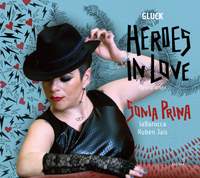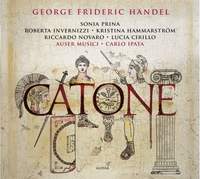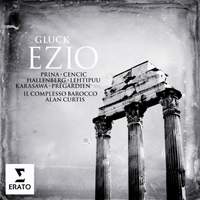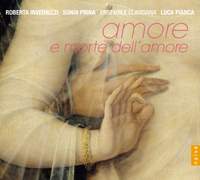Interview,
Sonia Prina on Gluck
 The phrase ‘not your conventional opera-singer’ is thrown about with abandon these days, but the Italian coloratura contralto Sonia Prina surely merits it more than most – as fiercely idiosyncratic in her repertoire-choices and vocal delivery as she is in her wardrobe-decisions, this is a singer who not only opted for a clutch of almost entirely unknown arias by Gluck for her first full-length solo recording (Heroes in Love, out this month on Glossa) but also raised eyebrows aplenty by sticking to her sartorial guns for both the album-cover and launch-concert at the Wigmore Hall (The Guardian described her look for the recital as ‘punk-rock androgyne’, whilst Opera Today saw it as ‘rebel Goth’).
The phrase ‘not your conventional opera-singer’ is thrown about with abandon these days, but the Italian coloratura contralto Sonia Prina surely merits it more than most – as fiercely idiosyncratic in her repertoire-choices and vocal delivery as she is in her wardrobe-decisions, this is a singer who not only opted for a clutch of almost entirely unknown arias by Gluck for her first full-length solo recording (Heroes in Love, out this month on Glossa) but also raised eyebrows aplenty by sticking to her sartorial guns for both the album-cover and launch-concert at the Wigmore Hall (The Guardian described her look for the recital as ‘punk-rock androgyne’, whilst Opera Today saw it as ‘rebel Goth’).
I met up with Sonia at the Barbican earlier this month, where she was singing Polinesso in a concert-version of Handel’s Ariodante under Harry Bicket (the cast also included Alice Coote in the title-role, Christiane Karg as Ginevra, and Mary Bevan as Dalinda). Over pre-performance coffee and cakes, we discussed the special demands and pleasures of Gluck’s writing for the alto voice, the challenges involved in establishing a career as a baroque contralto in Italy, her plans to branch out into later repertoire, and of course that arresting album-cover…!
It's a relatively bold move to record an entire disc of Gluck arias, almost all from operas which have disappeared from the repertoire - especially as you've avoided Orfeo, the only one of his works that gets regular stagings these days!
It’s exactly the same in Italy, although even Orfeo is not performed that much there: we don’t really know why, but in Italy this kind of eighteenth-century music is completely forgotten! But I got very lucky, because a few years back I did concerts and a recording of Ezio with Max Cenčić and Alan Curtis and that was just amazing – there are bits of that score which are completely fantastic. And on Heroes in Love we have two arias from Ezio: ‘Se fedele mi brama il regnante’, and ‘Se il fulmine sospendi’, which isn’t in the version that we did on stage and recorded. I did sing two performances of Orfeo with La Barocca (the orchestra on this CD), but we decided not to include anything from it on this disc because everyone is always singing ‘Che faro senza Euridice’ - basta! It’s not even the best aria in the opera! It’s the most lyrical, yes, but for me the most amazing passages of the score are the recitatives before and after ‘Che faro’: now that’s heart-melting, sublime music!
We've pulled together arias which are very different from each other – some are very similar to the baroque style (like ‘Tradita sprezzata’), and there is ‘Se tu vedesse’, which is very tailored to the Neapolitan tastes of the time. Some of them are very virtuosic – there’s one particular aria (I won’t say which!) that absolutely terrified me, even in the live concerts! Handel's coloratura is very consequential, beautiful and well-written, but the coloratura in Gluck is incredible because it’s so complicated and it doesn’t give you so much of a rest: arias like ‘Nobil onde’ are just relentless! So I wanted to bring all this music together; I was initially asked to record a Handel recital, but so many people have already done that and all the most beautiful music has already been recorded, so I said ‘Well, let’s do something else!’. Handel’s influence, of course, was very pervasive at the time and so naturally there are similarities in the styles, but Gluck's genius was to take a few elements and develop them in a completely different direction.
What’s coming up for you after the Ariodante tour? I hear rumours that your Verdi debut is imminent…
First of all I have concerts of the Duetti disc I recorded with Roberta Invernizzi a few years ago, then there’s a recital at the Handel Festival in Halle, then it’s the Proms for Beethoven 9! [Sunday 30th July, with the BBC National Orchestra of Wales, under Xian Zhang]. Perhaps people don’t associate me so much with that kind of mainstream, slightly later repertoire, but I studied at school as a lyrical singer and I only decided to specialise quite a bit later on! So I did ‘meet’ this repertoire when I was very young: I was singing a lot of Rossini and Donizetti, and then at one point I was asked to jump in for a singer at the Théâtre des Champs-Élysées doing Il trionfo del tempo e del disinganno and it was a blast! I had this lightbulb-moment where I thought: ‘This is what I want to do when I’m a grown-up!'. But what happens after twenty years of doing basically the same thing is that you want to do something else! And being a lyrical baroque singer is a thing that no-one in Italy understands - sometimes people think ‘Oh, you don’t have the voice to do the big operas', which is completely unfair, because for me to sing baroque music is much more difficult than singing Rossini or Donizetti. You have to have a really solid technique, of course, to sing bel canto, but when you sing baroque music you don’t take anything away (as many people think) – you have to add things!
Anyway, I’m getting older (I started singing when 19 and now I’m almost 42), and I got this offer to sing Mistress Quickly in Falstaff…in Parma, where there is the worst audience in the world! They’ll boo you just because you’re not Pavarotti! Seriously, I’ve listened to fantastic performances from that house where people are booing a singer because ‘Non è Simionato!’. So obviously I decided to go there...if I have to make an entrance as a Verdi singer, I might as well do it with a bang! There are really only two Verdi roles I can sing; I wouldn’t touch Ulrica [in Un ballo in maschera], because I don’t have that kind of top (a high B flat for me is like a scream!). My voice is much more developed in the low register: I can sing a D, even a C under the stave. Two years ago I did some concerts with [countertenors] Philippe Jaroussky and Valer Sabadus – we were doing a piece by Scarlatti [Oratorio per la Passione di Nostro Signore Gesù Cristo] and using Roman pitch (A = 392), and I had to sing from the C above middle C to the E under the stave. The guys were grumbling about the low pitch and having to work really quite hard to project, but all I could think was ‘This is so nice!’
True contraltos aren’t exactly thick on the ground - was it a struggle to find your real vocal identity, and were you ‘misdiagnosed’ as a different voice-type in the early stages of your training and/or career?
This sounds like a joke, but it’s true: when I was a little girl and doing a lot of singing at weddings, I didn’t know that contraltos even existed! People were always telling me ‘You’re a mezzo now, because you’re young, but you’ll grow up to be a soprano!’ Because I always had these very low notes, my teachers would give me roles for low soprano – which of course I couldn’t sing because I didn’t have any high notes, even at that age when my voice was still very light. They would ask me to sing Cherubino, and I tried and tried; then they tried me with Cenerentola, which is a bit lower, but I still couldn’t sing that high B at the end even with all the practice in the world! Eventually I went to a foniatra [speech therapist] (Franco Fussi, who is my mentor) and said ‘HELP!’, and he immediately said ‘Well, the only "problem" is that you’re not a mezzo!’. So off I went to the La Scala School with this piece of paper that said ‘I’m a contralto!’. From that very moment I had my identity, but those early days were really very difficult and demoralising.
Finally, I have to ask you about the story behind the extraordinary cover of the new disc – perhaps not an image people would necessarily associate with the Classical world of Gluck…!
It’s just me, as I really am! I was so happy with it, because I’m completely unconventional for an opera-singer – I love rock and roll, and punk in particular. I’ve always been very punk; a lot of people mistake me for Pink, even in the street, and in the beginning I didn’t know who she was! She’d become famous at a time when I was listening more to rock music, but then I ‘met’ her musically and thought ‘This woman's amazing – a really great singer!’. So when it came to shooting the artwork for the album, I said ‘I want to do a cover that tells people who I am’. I don’t like to put on dresses, it’s not me: I already spend most of my time on stage pretending to be someone else, usually some horrifying guy! (It’s so rare for me to play female roles: a few months ago in Madrid I played Eduige in Rodelinda, with Bejun Mehta as Bertarido and Lawrence Zazzo as Unulfo, and when I was on stage being a woman all I could think was ‘Am I walking properly?!’). Sometimes I want to be myself. My motto is if there are ten people listening to me, I don’t care if they all turn round and say ‘That’s good!’ - I just care if maybe 6 or 7 say ‘Wow!’ and the others say ‘Too much for me!’. I don’t want to please because I need to please: I want to tell my story!
Heroes in Love was released on 19th May on Glossa.
Available Formats: CD, MP3, FLAC, Hi-Res FLAC
Recent and related recordings from Sonia Prina
Handel: Catone
Sonia Prina, Lucia Cirillo, Riccardo Novaro, Kristina Hammerström, Roberta Invernizzi; Auser Musici, Carlo Ipata
'Sonia Prina sings numerous Leo arias as the tragic hero Cato, whose intense bitterness at his daughter Marzia’s confession that she loves his enemy produces stirring dramatic music of the highest quality.' (Gramophone)
Available Formats: 2 CDs, MP3, FLAC, Hi-Res FLAC
Gluck: Ezio (Original Prague version, 1750)
Sonia Prina, Max Emanuel Cencic, Ann Hallenberg, Topi Lehtipuu, Julian Pregardien, Mayuko Karasava; Il Complesso Barocco, Alan Curtis
'Contralto Sonia Prina is superb in the title role...velvety-voiced in her lugubrious aria at the start of Act 1, fiery and intense in the quick-fire 'Se fedele mi brama'...a committed and nimble account.' (BBC)
Available Formats: MP3, FLAC
Amore e morte dell’amore
Roberta Invernizzi (soprano), Sonia Prina (contralto), Luca Pianca (lute/director); Ensemble Claudiana
'Sonia Prina and soprano Roberta Invernizzi, both stars of the current baroque scene, are beautifully exact partners, their clashing dissonances as perfectly tuned as their harmonious counterpoint.' (The Observer)
Available Formats: MP3, FLAC






